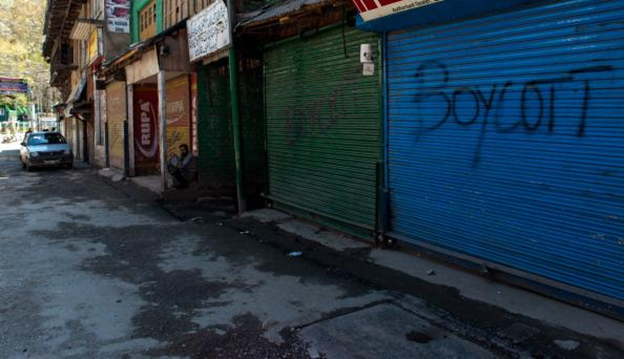BJP And PDP Vie For Top Slot in Jammu And Kashmir Polls
Boycott polls continues to be the flavour in the Kashmir Valley with BJP looking for electoral gains
NEW DELHI: Jammu and Kashmir is expected to be a close race between the Peoples Democratic Party and the Bharatiya Janata Party for the top slot. Neither party is expected to get a full majority to form the government, but clearly the single largest of the two will be able to instal its own chief minister and call the shots insofar as the complexion of a coalition is concerned.
PDP’s Mufti Mohammad Sayeed is just that little ahead in the electoral race if intelligence sources and the first pre-poll survey is to be believed. However, the BJP registering a major rise in Jammu and Kashmir is breathing down its neck, and as many in Delhi expect, could outrace the regional party in the final innings. However, conventional wisdom here seems to suggest that Mission 44+ might at this stage be little more than wishful thinking, with both the PDP and the BJP expected to hover around the 30 seats mark, give or take a few.
Because of the stiff fight the initial bonhomie between the PDP and the BJP has vanished, although in its campaign the BJP is careful not to hit the regional parties beyond a point. Its attack remains on the Congress party that is counting entirely on its leader Ghulam Nabi Azad to keep it from utter humiliation. Azad has a presence in the crucial Chenab Valley where if the BJP manages to polarise the votes along religious lines, the Congress might find itself on the same side of the fence as the PDP and the National Conference vying for the Kashmiri Muslim vote. This division as pointed out earlier in The Citizen will benefit the BJP.
PDP has opened channels with the Congress with Azad spearheading the move. His term as Rajya Sabha MP comes to an end in February and a possible coalition with the PDP in Jammu and Kashmir could help in a re-election. The Congress is divided in two camps in the state with differences between Saifuddin Soz and Azad sharp and at the moment clearly unsurmountable. However, given Azad’s proximity with Congress president Sonia Gandhi he is fairly assured of a free hand in managing the elections for the party in the sensitive border state.
Mufti has close relations with both parties, but having been in the Congress during his years in Delhi has been in regular touch with the leaders from that party. Sources said he is more inclined to join hands with the Congress than the BJP if given a choice, but “being a practical man will choose the option that serves him and the PDP best in the longer run.” The PDP is clear that he will be the chief minister if it forms the government,
The BJP has kept the choice of chief minister open but clearly if it emerges as the single largest party it will be because of a sweep in the Jammu region of the state that has 37 Assembly seats. The PDP, Congress and PDP will be giving a fight in some seats, but the BJP leaders in the state are optimistic that the share of the others outside the Kashmir Valley will drop substantially. Local BJP leaders in Jammu are openly advocating a non-Muslim chief minister and will pressure the Delhi leadership for the same if the party manages to head a government in the state. This will be in consonance with BJP president Amit Shah’s call to establish a “nationalist government for the first time” in Jammu and Kashmir. The possibility of the BJP bringing in a Muslim CM if it is in power is seen by its leaders as well as sources in the know as “highly unlikely.”
Significantly, the approach of both the BJP and the PDP if they emerge as the single largest party respectively will be different to each other. The BJP’s first preference will be to make up the numbers to form the government from independents, and smaller parties in the state. A coalition with the PDP will be decidedly a second preference to allow it more freedom in running the state. Besides this has been the approach of the party under Amit Shah in other states, where it has preferred the smaller parties to the main opposition, as in Maharashtra where it has jettisoned Shiv Sena by refusing to accept conditions for an alliance.
The PDP however, will look to the BJP for a coalition and as sources here said, “if it does not form an alliance with the ruling party at the centre its days in Jammu and Kashmir will be numbered.” This has been determining factor of sorts for both the National Conference and the PDP--- a realisation that their relations with the party ruling Delhi should be close and totally non-confrontationist for financial help and political support. The only reason why Chief Minister Omar Abdullah has been able to take on the BJP at the centre is because of the certainty of Assembly elections, and even so he has faced the flak from the Kashmiris for not getting the monies required for the successful rehabilitation of the flood victims.
Meanwhile the Kashmiri’s are positive about boycotting the elections in the Valley where the turnout is expected to be particularly low. However, the Army decision to convict the personnel for the Machil fake encounter case; and its press conferences acknowledging and apologising and setting up an enquiry for the gunning down of four young people in a Maruti car in the Valley by soldiers at a barricade is being offered as a palliative to the Kashmiri voters. As sources here said the message is that the Kashmiris can be assured of justice and fair play under the BJP with the Indian Army taking an unprecedented position in both cases.





